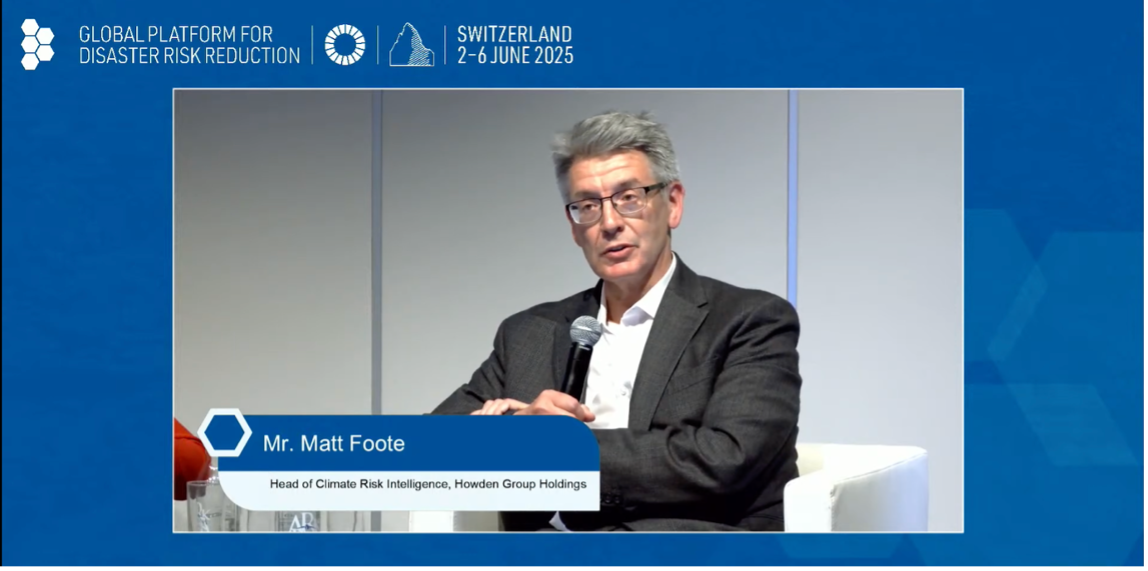Voices, networks and Impact: The GEO Community at GPDRR 2025

Better data and technology are essential. That was the pulse of the Co-Chairs’ Summary of GPDRR 2025. GEO’s community brought that message to life in Geneva, showing how Earth observations and collaboration can turn data into resilience across early warnings, ecosystems, finance and youth-led innovation.
The Global Platform for Disaster Risk Reduction (GPDRR) is always a marathon of exchanges. This year’s forum in Geneva featured two days of preparatory events, including the first Global EW4All Multi-Stakeholder Forum, followed by three days of main sessions, and a packed programme of workshop-styled “learning labs” and “Ignite Stage” talks.
Beyond the plenary halls, GEO’s impact was felt through the voices of its community members, who showed how Earth observations are being turned into action.
Highlights from the GEO community
Taiwo Ogunwumi used his Ignite Stage talk to spotlight the GeoHazards Risk Mapping Initiative in Nigeria. By turning Earth observation data into practical flood prediction and preparedness tools, he showed how youth-driven innovation is empowering communities.

Shunichi Koshimura presented his plan to expand real-time tsunami inundation forecasting globally through GNSS-based systems, in collaboration with UNESCO IOC. His plan would also leverage his startup, RTi-cast, the world’s only private tsunami forecasting provider, showing how Earth observation technologies and innovative business models can directly save lives.

Yvonne Walz presented FRAME-ECO, a framework to assess climate change and disaster-related losses of biodiversity and ecosystem services, in a learning lab on progress in disaster tracking systems. Using a spatial explicit approach, it guides countries in evaluating losses related to ecosystems and includes an Annex compiling relevant geodata to support assessments. It’s ready to be applied in different country contexts for its further development.
Juli Trtanj (co-lead of GEO EO4Health) moderated a special event on extreme heat governance (watch video). She emphasised the need for a common governance framework to help countries move faster in tackling one of today’s deadliest risks. She has also been involved in the development of GEO’s Global Heat Resilience Service (GHRS), which can substantiate the work of the governance framework.

Matt Foote (GEO Programme Board) participated in the thematic session on integrating disaster risk reduction into global finance (watch video). He highlighted the insurance industry’s capacity to de-risk key parts of the investment value chain, while identifying barriers to capital flow and links to extreme events. While the session itself did not focus on Earth observations, Matt has been a strong advocate for advancing the use of Earth observations in insurance to strengthen resilience.

Bapon Fakhruddin (GEO Programme Board), together with Charles Balagizi and Thibyan Ibrahim, contributed to a learning lab on people-centred approaches to climate risk management under EW4All. The session featured a concept developed by Bapon on co-production and co-creation of people-centered climate risk management, illustrated in the CREWS guidance document (p9). GEO looks to actively contribute to the CREWS initiative in the years ahead.
Urbano Fra Paleo participated in a learning lab on the Hazard Information Profiles (HiPs), a classification and description of 281 hazards that harmonises the collection of hazard data and reporting of disasters. Earth observation is essential for mapping the spatial extent of hazard events, using HiPs, ensuring the data is robust and comparable.
Looking ahead
The Co-Chairs’ Summary of GPDRR 2025 emphasises stronger science-policy interfaces, inclusive governance, and trusted risk information. GEO’s community contributions in Geneva brought these priorities to life, showing that open, co-developed Earth intelligence is becoming a growing practice shaping resilience worldwide.